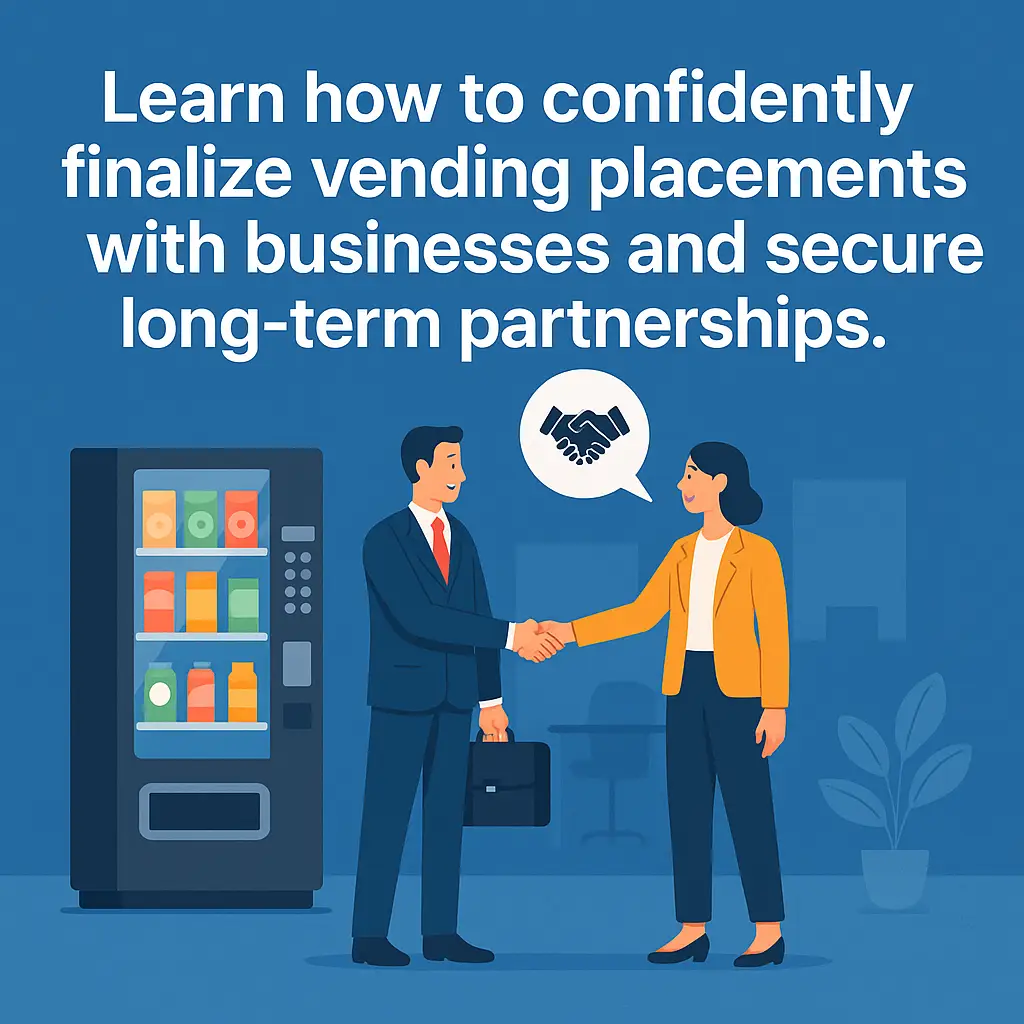How to Close a Deal with a Location
Learn how to confidently finalize vending placements with businesses and secure long-term partnerships.
Back to Vending Machine Locators ResourcesLearn how to confidently finalize vending placements with businesses and secure long-term partnerships.
Back to Vending Machine Locators ResourcesStart your 30-day free trial and get instant SMS and email alerts whenever a local business needs vending service. These are real location leads to help you grow your route — you decide which ones to buy, no obligations or contracts.
![]() Decision-makers need clear value and minimal maintenance commitment
Decision-makers need clear value and minimal maintenance commitment
![]() Site walkthroughs can increase trust and show preparedness
Site walkthroughs can increase trust and show preparedness
![]() Framing around employee benefit helps gain faster approvals
Framing around employee benefit helps gain faster approvals
30 days free, then $39 / month.
No Commitment. Cancel Anytime.

Securing a vending machine placement goes beyond identifying a good location — it requires confidently closing the deal with business decision-makers. To finalize partnerships effectively, operators must understand how to position their offer, address a location's concerns, and communicate professionalism throughout the process.
Begin by identifying the actual decision-maker. Often, this will be the property manager, office administrator, or HR director. Speak their language by highlighting convenience, no-cost setup, and the benefits to employees or tenants. Make it about them — not just about your machines. Offer specific examples of what you'll provide (e.g., combo machines, snack selections, energy drinks, or healthy items) and how often you'll service them.
Next, offer a short, clear proposal. Keep it easy to understand, ideally a one-pager outlining equipment type, product choices, service schedule, and contactless payment features. Include basic images or mock-ups if possible. This level of professionalism sets you apart from less-prepared vendors and reinforces trust.
During conversations, be ready to handle common objections. Some locations may have had bad experiences previously — emphasize your reliability, regular maintenance, and response commitment. If applicable, highlight smart machine features or freshness monitoring, which address frequent pain points like expired products or machine outages.
Whenever possible, offer to walk the site and confirm the best location for machines. This proactive step shows professionalism and reduces perceived effort or risk for the client. Don’t push — instead, ask direct but respectful closing questions like: “Does this setup work for your team needs?” or “Can we move forward with install next week?”
For long-term success, always follow up in writing and deliver on everything promised. Clear, confident, and well-prepared communication is key to turning initial interest into a signed agreement.
To build additional trust with potential locations, it’s also smart to avoid the common pitfalls new vendors face. Understanding which products perform best is another way to demonstrate confidence and alignment with their audience.
Vending Exchange connects vending operators with real businesses actively looking for vending services—including traditional machines, AI coolers, and office coffee. Get instant SMS and email alerts when new opportunities are available in your area. No contracts or monthly fees—just buy the leads you want. Start your free 30-day trial today and grow your vending business on your terms.
Start by identifying the right point of contact, usually a manager or admin. Introduce yourself clearly, explain the benefits, and request a short meeting to provide details.
Keep it simple: describe the machine type, sample product options, payment method, service frequency, and maintenance plan. A one-page outline with visuals works well.
Acknowledge their past experience and explain how your service is different—highlight your responsiveness, quality control, and tech features that prevent recurring issues.
Offer to assess possible placements in person. Often, combination machines reduce footprint. Glass-front machines can also fit compact breakrooms or entryways.
Common concerns include machine maintenance, product freshness, or electrical requirements. Be ready with solutions and emphasize that setup is free and low-effort.
Most deals involve a basic agreement or understanding in writing. Formal contracts aren’t always required, but documentation protects both parties.
Include photos, detailed service plans, and a clear list of product types. Demonstrating preparation and flexibility will earn trust more quickly.
Yes—send an email restating your proposal, thanking them for their time, and offering to clarify any questions or provide references.
Sometimes, but visiting is preferred. It shows commitment and lets you plan logistics. A walkthrough often removes objections and builds rapport.
It depends on the business. Some approve quickly; others may take a week or two. Regular, professional follow-up keeps the process moving.